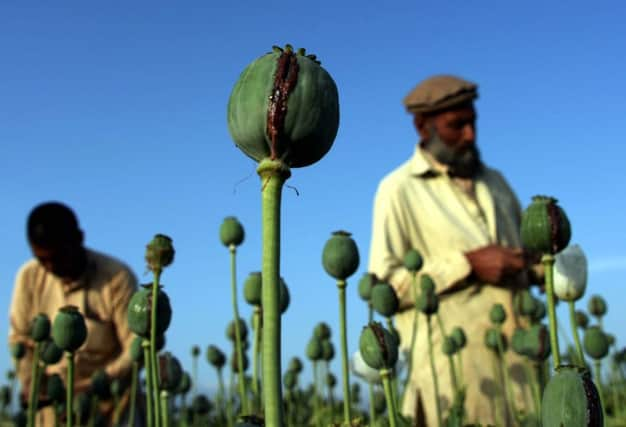Drug lords grow super-size poppy seeds


The plants grow bigger, faster, need less water than seeds they have used previously, and give up to double the amount of opium, they say.
No-one seems to know where the seeds originate. The farmers of Kandahar and Helmand provinces, where most of Afghanistan’s poppies are grown, have said they were hand-delivered for planting early this year by the same men who collect the opium after each harvest, and who also provide them with tools, fertiliser, farming advice – and a much-needed cash advance.
Advertisement
Hide AdAdvertisement
Hide AdTo the villagers, the shadowy men are intermediaries for drug lords and regional traffickers working with or for the Taleban – part of the extensive web that fuels the opium trade and keeps the poppy farmers in a clasp of terror and dependency.
The impoverished farmers have little recourse but to accept the seeds and other farming materials on credit, to be paid back when they harvest the crop, continuing a cycle of debt.
Afghanistan’s poppy harvest, which accounts for most of the world’s heroin, is worth an estimated £2 billion a year, according to the United Nations Office on Drugs and Crime.
Production hit a record high in 2014, up 17 per cent compared with the previous year, as opium and the drugs trade continued to undermine security, rule of law and development, while funding both organised crime and the Taleban – often one and the same.
The trend is expected to continue in 2015, in part thanks to the new poppy seeds, according to officials tasked with overseeing the eradication of poppy crops.
This harvest in late spring is expected to surpass last year’s country-wide record of 7,800 metric tons by as much as 7 per cent and 22 per cent in Kandahar and Helmand provinces respectively, local officials said.
Experts say the Taleban, who have waged war on the Kabul government for more than a decade, derive around 40 per cent of funding from opium, fuelling their insurgency.
Fierce fighting in recent months in poppy-growing regions shows the Taleban’s determination to protect their trafficking routes and the seasonal workers who come to earn money at harvest time from government forces under orders to eradicate the crop.
Advertisement
Hide AdAdvertisement
Hide AdGul Mohammad Shukran, chief of Kandahar’s anti-narcotics department, said the new seeds came with the drug traffickers, but he did not know exactly where from. They yield “better drug plants, which require less water and have a faster growth time,” he said.
“This is a big threat to everyone,” he said, adding that Afghanistan’s central authorities had failed to act on his warnings.
Growing poppy for opium is illegal in Afghanistan and forbidden under Islam, the country’s predominant religion.